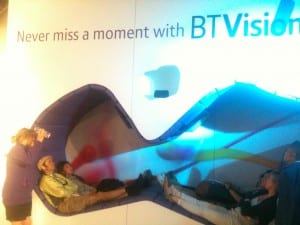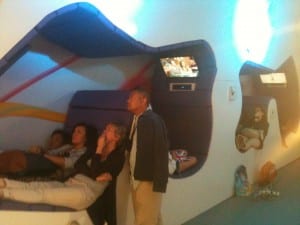Report on Outcomes of E-Learning Development Grant
Overall aims and objectives
The ‘Virtual Learning Environment’ (VLE) project aimed to develop new online tools to facilitate interdisciplinary learning at UCL. The project was particularly aimed at students registered on multidisciplinary Masters courses, such as the MSc Biomaterials & Tissue Engineering, run by the Department of Mechanical Engineering. The objectives of the project were guided by the pedagogical principles that knowledge acquisition and learning are facilitated by interaction and collaboration with peers. To achieve this, the Virtual Learning Environment needed to offer a way of enhancing student interaction whilst providing an opportunity for peer-to-peer learning that offered unique motivational and cognitive benefits, whilst also enabling students from different background disciplines to grasp basic concepts.
Methodology – Explanation of what was done and why
Time constraints on a Masters degree course meant it was important to focus the content of the VLE on the fundamental principles necessary for students to grasp key concepts relevant to the course. A VLE was therefore devised to provide online laboratory tutorials (Virtual Laboratory) and an interdisciplinary learning forum (Virtual Journal Club).
(1) Virtual Laboratory: The Virtual Laboratory was based in Moodle and consisted of a portfolio of tutorials introduced throughout the course that were designed to prime the students (primarily from an engineering background) with the working practises of a Life Sciences laboratory. This involved producing learning material that could be loaded into iSpring presentations, which were subsequently converted into Flash format for uploading onto Moodle. Topics covered included aseptic tissue culture techniques, micropipetting, centrifugation, cell counting and enzyme linked immunosorbent assays. The latter two topics included mini quizzes and data analysis tasks. These materials were developed with the assistance of student volunteers who were registered on the MSc course. Their work on the project involved capturing video clips of someone performing the techniques, scripting, dubbing and editing. The students were remunerated for the cost of their time working on the project.
(2) Virtual Journal Club: The Virtual Journal Club (VJC) was established in My Portfolio. After an introductory session to the VJC to show its contents and workings, a different student was invited each week to review the strengths and weaknesses of a paper they had selected from the recent literature relevant to a topic covered in the course module. An online discussion was then opened up to the other members of the group who participated by uploading a brief posting onto the blog.
Project outcomes – Description and examples of what was achieved or produced
The VLE received positive feedback from students on the MSc Biomaterials & Tissue Engineering course. An Opinio survey was conducted to evaluate the students’ perception of the VLE. These data indicate students generally recognised the benefits of participating in the VLE, despite many of them not having previously used online or virtual learning environments. The VLE received positive feedback from students on the MSc Biomaterials & Tissue Engineering course. An Opinio survey was conducted to evaluate the students’ perception of the VLE. These data indicate students generally recognised the benefits of participating in the VLE, despite many of them not having previously used online or virtual learning environments.
Opinio survey data from students on the MSc Biomaterials & Tissue Engineering course:

Virtual Journal Club:




Virtual Laboratory:


From a course lecturer’s perspective, the VLE enabled me to cover more topics during the limited time available. This was particularly evident in the practical sessions where the students were more familiar with the concepts being introduced. Having already been introduced to some of the techniques with the online tutorials they became proficient with the techniques being used much more quickly than groups taught in previous years. An encouraging result from the survey was the students’ impression that the Virtual Journal Club helped them review literature more critically. This skill is an important component for their laboratory based research project and was something that was clearly lacking in previous years.
Evaluation/reflection:
How did the project enhance student learning?
The project enhanced student learning by providing an opportunity for students to be ‘preconditioned’ for certain aspects of the course prior to classroom based activities. An example of this occurred with the viewing of a Virtual Laboratory movie clip explaining aseptic technique, which was followed by the practical session. By enabling the students to be familiar with the techniques that would be used during the laboratory practical session, time was saved allowing students additional time to reflect on what was being covered during the session. The feedback from the Opinio survey generally supported this observation.

How did the outcomes compare with the original aims?
The outcomes of the project were in line with the original aims of the project. A VLE has been created and this has been positively received by the students. The VLE has provided an additional tool for cross disciplinary learning. The students were more enthusiastic about the Virtual Laboratory compared with the Virtual Journal Club. After the first few students had volunteered for the Virtual Journal Club, subsequent volunteers were less forthcoming. To encourage participation a different approach will be adopted for the coming academic year, whereby the participation contributes to 5-10% of the coursework module mark.
How did the project benefit the student workers?
The student workers received training in the production of online teaching aids. They also gained experience in scripting, producing and editing video clips. They also benefitted from financial remuneration on completion of their work.
How has the project developed your awareness, understanding, knowledge, or expertise in elearning?
The project has developed my awareness of the benefits and drawbacks of e-learning. However, the former are greater than the latter and I plan to continue developing this side of the curriculum. The planned peer-to-peer learning that the project aimed for will only be fully achieved if all the students are fully engaged. Therefore participation rates of the Virtual Journal Club will be monitored and reminders sent for each individual’s contribution.
Scalability and sustainability – How will the project continue after the ELDG funding has
discontinued? Might it be expanded to other areas of UCL?
Interest in the Virtual Laboratory and Virtual Journal Club has been expressed by other course coordinators at UCL and it is hoped that similar technology will be rolled-out to a wide range of interdisciplinary courses at UCL. The Opinio survey has revealed areas where the VLE can be enhanced in the future, as shown below.

Dissemination- How will the project outputs of results be disseminated to the department, College or externally? Are there other departments which would find value in the project outputs or results?
Other members of the department are aware of the VLE and have expressed interest in developing similar strategies for other courses. Additional research questions and developmental ideas are going to be explored in the next academic year. It is hoped these data will lead to a journal publication to enable further dissemination outside of UCL.
 Close
Close

















